- Home
- Tim Winton
Minimum of Two
Minimum of Two Read online
These belong to Jesse and Denise:
my blood, my water.
One and one make one
and one
and one and one make one . . .
Playground chant
CONTENTS
FOREST WINTER
NO MEMORY COMES
GRAVITY
THE WATER WAS DARK AND IT WENT FOREVER DOWN
NILSAM’S FRIEND
MINIMUM OF TWO
DISTANT LANDS
LAPS
BAY OF ANGELS
THE STRONG ONE
HOLDING
MORE
DEATH BELONGS TO THE DEAD, HIS FATHER
TOLD HIM, AND SADNESS TO THE SAD
BLOOD AND WATER
Forest Winter
EACH DAY THE young man left his wife and child asleep and went out into the forest to saw wood. Winter had closed in. The sawing was bitter work, but it had come at the final moment, before they gave up on the country and went back north to the city and the hardship of the dole. He drove out in the boss’s utility and searched for fallen timber which he would cut into blocks and cart back to the tiny valley to store for the holiday season. The bawl of the saw hurt his ears so that at the end of a day’s work his head had the same stuffed feel as it had after a night’s playing with the band, before everything fell apart.
At noon he sheltered in the utility and ate his lunch of bread and cheese with the rain trickling down the windows and the quiet of the forest coming upon him. It was lonely in the middle of the day with no company but the pale trunks of karri trees. During his morning break, the circumstances of the past few months rested hard on him. When the light was weak and if the wind was especially hard and cold, he would sit, chewing, motionless, almost catatonic from misery. But when it came time to take up the chainsaw again and sharpen its teeth before going back to whichever great, dead tree he was dismembering, he knew with certainty that he was still all right, and the fact that he could swill his tea dregs into the bracken and rise from his haunches with the saw was enough for him to know that he wasn’t broken. He had been broken once before, years back, when he was still half a boy, and he knew that when you were beaten properly, you didn’t get up; you had to wait for some obscure grace to put you together, and there was no guarantee it would come by a second time.
Most days he returned to the crooked little valley before dusk to see the two dozen timber cabins and the shop and the old school and the ruins of the sawmill echoing with the misanthropic calls of magpies. His boss was a retired farmer who’d bought the valley years ago and turned the remains of the logging town into a holiday village for the spring and autumn. Summer and winter were extreme down here and the place deserted but for the owner and his wife and whoever he hired in the off-season.
It was here the young man and his wife and child found themselves the day their money ran out. By then they were just driving without purpose. Too many things had gone against them. The job and the cabin were a sudden mercy.
A month after they arrived, the young man came home one evening to find that the stove and the fire were still unlit. The small house was cold and in darkness and the baby was screaming.
‘Rachel?’
He found his wife on the mattress on the floor with the child beside her. When he turned the light on he saw her on her back, mouth wide, struggling to breathe. Her eyes were so big in her face they frightened him. He scrabbled around in the bedclothes. The baby shrieked.
‘Where’s your Ventolin? Your inhaler, where’s your inhaler?’
The young woman was concentrating too hard on getting air to be able to speak. The noise she made in her throat was like the sound of a bough tearing loose in a storm, back and forth, creaking.
He picked the baby up and took the full force of its squall in his ear as he flattened it to his shoulder. He found the inhaler on the floor between tissues and ointments and folded nappies. He felt panic. He brought the inhaler to her mouth with a spare hand, but she pushed it away. That tearing sound faltered for a moment and she managed a single word.
‘Old.’
He looked at the cylinder. It was a pressure pack the size of a bottle cork. He read the expiry date. Months too old; it was likely useless, perhaps dangerous – he didn’t know.
‘Oh. God.’
He went into the dark kitchen with the baby. Tears and saliva ran down his neck. He wrapped the pink-faced little boy tighter in his blankets and put him in the carry basket. He took the basket out to the car. The sun was well down but the tops of the karris were visible in silhouette and he could still make out the skeleton of the old water tower. For a moment he considered going to the boss for help; it was only a moment.
With the child screaming out in the car, he dressed his wife and wrapped her in blankets and hoisted her up.
The nearest town was twenty-five kilometres east. As the young man drove the old station wagon hard along the narrow road between the bodies of trees and the eyes of feral cats and foxes, he could barely hear the motor over the baby’s screams and the pendulous, tearing respiration of his wife.
Everything was changed. How long had it been since they were happy? The music was gone, the money. And Rachel, what had happened to her? Having the baby had muted her. The forceful, funny girl he had married, had suddenly become placid, listless, sickly, as though she’d had the life torn from her as well as the child. He was afraid the breaking of things had let that old helpless panic get back into him.
Winding down the hill towards Bridgetown, he began to sing madly.
‘A frog went walking on a summer’s day, a-hum, a-hum . . .’
Rachel lay against the seat with her head back, eyes wide. He drove hard. He couldn’t let this happen. A scream rose in him, like the night the baby was dragged hollow-chested from her.
A frog went walking on a summer’s day,
He met Miss Mousie on the way, a-hum, a-hum,
A-hum-a-hum-a-hum!
The pharmacist was still inside the shop – the young man could see him moving about – but the doors were locked and the CLOSED sign was up. The young man bashed on the glass and noticed in the high beam of the idling station wagon how cut and crusted his own fingers had become. The pharmacist ignored him. He beat the glass harder. He shook the door until the burglar alarm set to ringing. Shedding his white coat, the pharmacist came down the aisle between rows of cough medicines and sweets and stuffed toys. The young man saw he was angry.
He thinks I’m a junkie, he thought; he thinks I’m a fuckin’ junkie. In the city, a pharmacist might carry a gun at night. But, God, this was the country. He saw the man mouthing words at him.
‘Ventolin!’ the young man cried back. ‘We want some Ventolin. Turn the alarm off, for God’s sake! Open the bloody door.’ He looked back in the headlights. Oh, Rachel.
The pharmacist stood looking. The young man pointed to the car.
‘Asthma, bugger you. She’s sick!’ His fists rested on the glass and he was stiff.
The doors opened a crack. The alarm rang on. It rang in his head, right through him.
‘My wife’s got asthma. She can’t breathe. She needs Ventolin.’
‘Doesn’t she carry it?’ The pharmacist was tall. He squinted. The young man realized the man couldn’t see with the car lights in his eyes.
‘It’s expired. Look, she’s nearly had it.’
‘You need a prescription. And money.’
‘We’ve got a nine week old baby boy in the back. Or how ’bout my index finger as a deposit. Will that do? For Chrissake!’
‘Stay there.’
‘Oh, listen to it.’
When the man came back with the tiny cylinder, the young man snatched it from him and ran to the car. Rachel had begun to sob. It was pit
iful. He stuck the inhaler between her lips and sprayed it. The bitter smell seeped out. The baby whimpered hoarsely. He sprayed, catching her on the intake. And again. He sank against the seat with the lights on and the motor still running. He saw the pharmacist locking up. The alarm died.
Late in the evening the young man sat in the darkness and drank the coarse volatile claret the locals called Kirup Syrup. The stuff found a big emptiness in him. Relief had consumed something inside. Mother and child were asleep on the mattress in the bedroom. He was weary. There was a day’s work ahead in the morning. He could not sleep. Kirup Syrup puckered his mouth and made his lips fatten. After midnight he reeled out into the still forest night and saw clouds rushing across the moon above the crown-shadows of the trees. It was an eerie sight; not a flurry where he stood, but up there a maelstrom. He was grateful for the sight of it. He was thankful for Rachel and the baby. They were something to check himself against. And now he was drunk and would have fallen down asleep in leaf litter if the cold hadn’t driven him into bed.
Before dawn, he woke and crept about in an unaccountably cheerful mood. He drank steel-cold water and washed his face and looked at his hands in the half-light. They no longer looked like a guitarist’s hands and the fact was suddenly of no consequence. For a while he stood at the bathroom window and watched light and mist and birds moving at the feet of karris where bracken and grasses hung sluggish with dew. Then he went to the bedroom where Rachel and the baby were stirring. He took the old kerosene tin they used as a wastepaper bin to the kitchen.
At the stove, he tipped the contents of the tin into the firebox. The papers were old bills and envelopes, Kleenex, and a few crumpled sheets that were his latest clumsy attempts at songwriting. He laid some pine kindling on top and lit it. He went out for more wood.
When he opened the firebox again a few minutes later, the blaze exploded in his face with the sound of a gunshot. He squealed. In that instant his vision was gone, and he fell back against the rickety deal table.
‘Jerra? Jerra! What’s wrong? What’s happened?’ He felt her propping him up.
‘I can’t see,’ he cried. ‘Nothing.’ His eyes felt scorched. There was soot and charcoal grit in his mouth.
‘Let me see.’
‘Oh, Jesus.’
‘Get up.’
‘I —’
‘Get the hell up, Jerra. Come to the sink.’
He felt her pinching grip on his forearms. Water was splashed on him. For a moment he saw those clouds rushing across the sky; he felt delirious. Somewhere, the baby burbled. He was happy; he felt crazy.
Then there was light. Water in his eyes.
‘Better?’
‘I dunno.’
‘Don’t be wet, is it better or not?’
‘Yes.’ He saw the fogged outline of her arm, and for a moment, a clear vision of her brown eyes. He listened to her wheeze. In a few minutes he could see properly, though his eyes felt as though they were full of ballast.
The kitchen floor was black with soot, and as far back as the opposite wall, pieces of kindling and charcoal were strewn about.
‘What was it?’
Rachel straightened from the firebox of the stove and held up the distorted remains of the old Ventolin cylinder. She showed him the metal fragments all over the linoleum.
‘Must have tossed it in with the wastepaper,’ he said.
‘You could have lost your eyes, Jerra.’
‘I’ll be more careful.’
Out on the back stoop after breakfast, the young man watched the rain coming in from the south. He heard Rachel coughing as she sang to the child.
‘A frog went walking on a summer’s day, a-hum . . .’
He sharpened the teeth of the chainsaw and prepared to go out into the day.
No Memory Comes
I
THE BOY LEAVES his parents on the beach and wanders up through the dunes. Night has fallen and the lights of holiday shacks are budding on the hill. There is no wind. He hears a voice, slows down, homes in on it, and falls to his belly at the vegetated lip of a razorback dune. Down in the bowl between hills he sees two bodies. Hears them whispering. The sand on the declivity is fine and wind-smooth. As he shifts, a tiny ripple begins. He moves back. Another swell rolls down.
A shout!
The boy sees a man’s body rising against the luminous sand, pulling up his pants. The boy turns and surfs back down the face of the incline with the sound of a silhouette behind him. He fights his way through the white seas, up slope, down-trough, from shadow, to light, until he comes out on the flat beach where his mother and father sit talking low and he sees no one is behind.
Happy New Year, his mother says.
Happy New Year, his father says.
A year has passed. He is older. He does not believe it.
That night he climbs into bed between his parents. His father muffles a weedy fart. His mother sleeps with a glick in her throat. The boy worms in and gets ready to dream that the new year will never come. Everything is fine right now. He has no need of it.
II
The boy is in love with school. He knows he is young. He knows he doesn’t need to fly to Hong Kong every week or wash clothes. He only has to go to school and say things right and try hard. He only has to see his friends and not get caught playing British Bulldog.
On the way home he walks with a boy from the Catholic school. They both live on the hill behind the beach. In the summer they are in the same swimming classes – their patter kick and their duck dives are about the same. By the end of summer they are best friends. Summers go by, but the boy knows everything stays the same. Even at twelve he doesn’t feel any older.
At the end of one summer, the boy and his friend, on their way to the beach, find a man dead in his car. There is a hose from the exhaust going into the boot. It takes them a long time to decide the man is not asleep. When the ambulance comes and the men break the windows to pull the man out, the boys see the upholstery look of the dead man’s face. When the ambulance leaves, the boy’s friend begins to cry. He tells the boy that he wets the bed every night. And once his father tied the wet pyjamas round his neck and sent him to the Catholic school like that. This is his biggest secret. The boy sits on the kerb and watches his friend’s fists. In the vacant lot behind, the wind stirs the whispering wild oats.
Later that week, the boy visits his friend’s place and pisses in his father’s golf buggy. He is older now, he knows, but he knows too that he and his friend will never change.
III
The boy goes to high school. He likes it after a while, though it is never as good as primary school. His friend leaves the Catholic school and they are in the same classes.
The boy still has weekends up the coast with his parents in the little asbestos house. His father drinks beer and his mother reads.
After school the boy and his friend ride down to the beachfront, and if there is no surf they play pinball and pool at the Snakepit and Minderbinders. They see bikies and rockers. The boy knows his mother came here when she was a widgie. He has never seen a widgie, but he feels it is right that the place should still be there for him.
Sometimes the boy and his friend lie on the sand and talk about where they will hide when the world ends. They talk about God now and then, but it always brings them back to the end of the world. One afternoon, there on the sand with a dollar’s worth of chips, they make a vow to look out for each other when it happens. They know it is only a matter of time. The burger joints wink and gulls hang over them and everything is solemn.
IV
The boy hears his mother on the phone. When she is finished, she tells him his father is not coming back from Hong Kong because he has fallen in love with the housegirl. She lights a cigarette. He goes into the bathroom, locks the door, turns the shower on full-belt, and cries. He beats the tile wall and his knuckles lift.
His mother gets a job. The boy comes home to an empty house. He does his homework, he mucks around
with his best friend. He doesn’t go up the coast anymore, even though his mother got the beach house in the divorce settlement.
The boy looks through old photo albums.
V
The boy bores people at parties. He tells them everything he remembers. He remembers everything. He knows the name of every song on every old record. He knows the name of every member of his first school class. He knows the name of every boy a girl has ever liked. When everyone gets their hair cut and gelled, he keeps his long. His Hawaiian shirts make people laugh. Girls get drunk and go to sleep in his lap. After every party he waits for his friend, cleans the vomit off him, separates him from a clinging girl and they go home together. Everything stays the same between them.
At sixteen they buy a car together. They save by selling milk bars their own empty bottles. They sell their bikes. The boy sells his newest record. They wash cars. They get a paper round. The car is an old HR Holden. They paint it green with brushes and housepaint.
The boy’s friend is the first to turn seventeen and get a licence to drive. Together they cruise along the coast and into the city. One night rockers kick the windscreen in at the traffic lights. They U-turn into a one-way street. They have to turn around again on the footpath. Back on the beach where it is quiet they buy a bottle of green ginger wine and remember it.
The boy’s friend gets a regular girlfriend. The boy doesn’t mind. They all ride around together. She graduates from the back seat to the front. After a while the boy finds himself sitting in the back. He doesn’t mind. In the back he stretches out and tells old stories. On lonely hills overlooking the river, cruising down neon streets on hot nights, parked beneath the sound of gulls and pinball machines, he tells them how it used to be.
The boy’s friend and the girl are voted Head Boy and Head Girl at school. He votes for his friend because they are best mates. He votes for the girl out of loyalty. People say they make a fine couple.

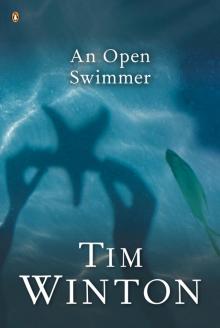 An Open Swimmer
An Open Swimmer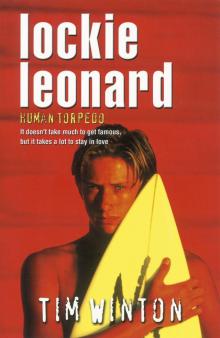 Human Torpedo
Human Torpedo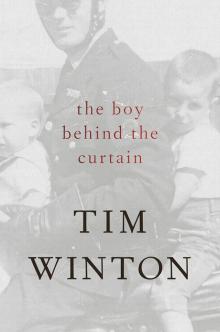 The Boy Behind the Curtain
The Boy Behind the Curtain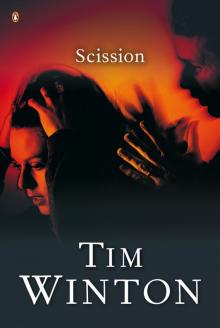 Scission
Scission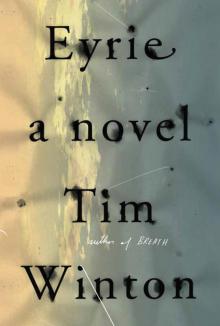 Eyrie
Eyrie Island Home
Island Home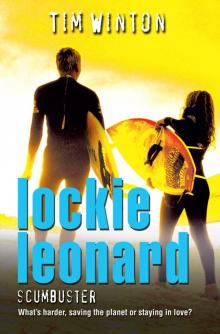 Scumbuster
Scumbuster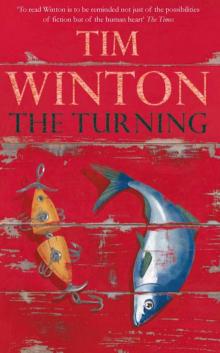 The Turning
The Turning Legend
Legend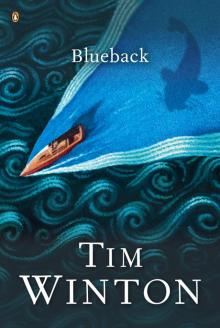 Blueback
Blueback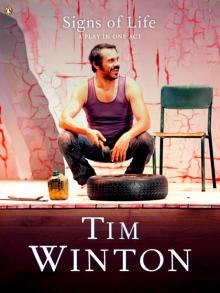 Signs of Life
Signs of Life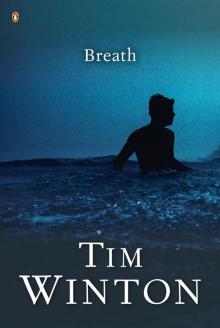 Breath
Breath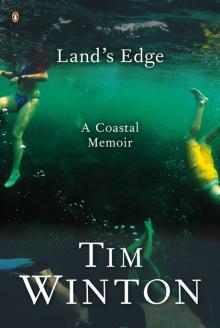 Land's Edge
Land's Edge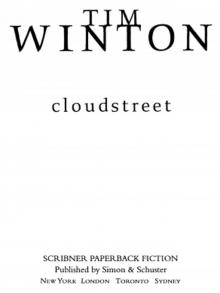 Cloudstreet
Cloudstreet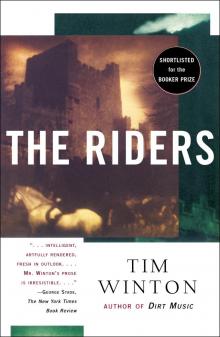 The Riders
The Riders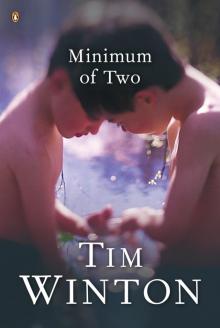 Minimum of Two
Minimum of Two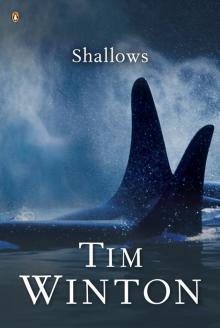 Shallows
Shallows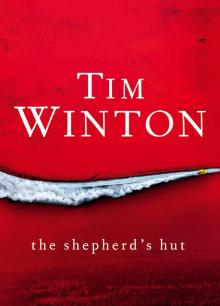 The Shepherd's Hut
The Shepherd's Hut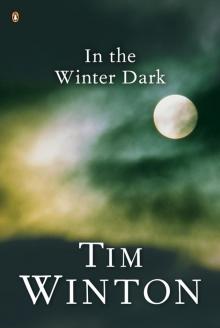 In the Winter Dark
In the Winter Dark